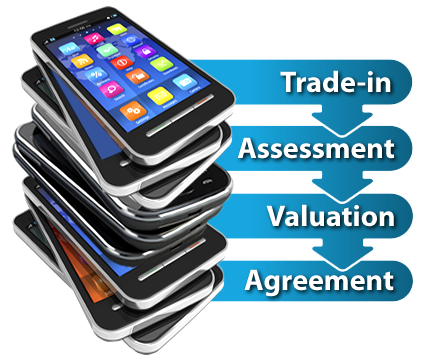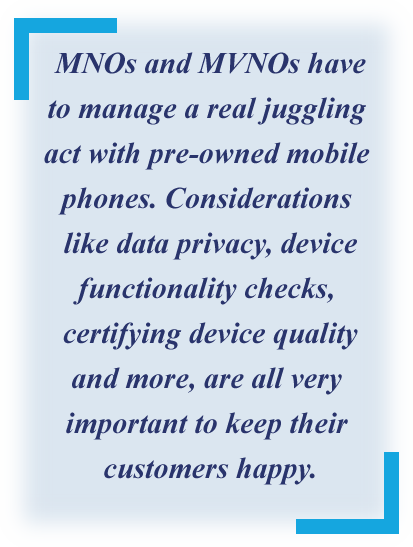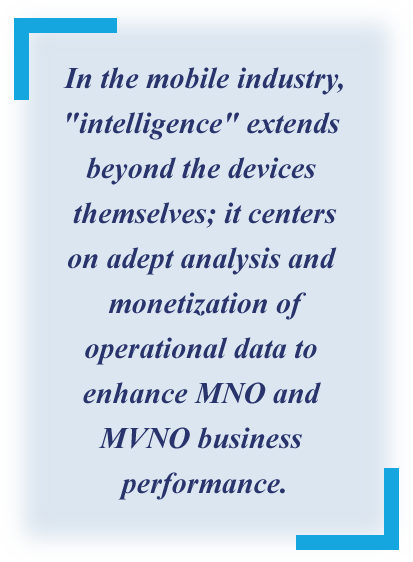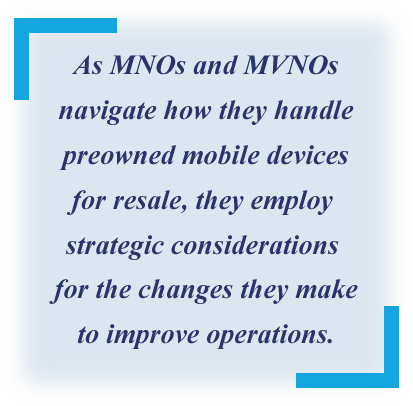The FutureDial Blog
(10.02.2023)

![]()
TAKEAWAY: In the fiercely competitive world of pre-owned smartphones, Mobile Network Operators (MNOs) and Mobile Virtual Network Operators (MVNOs) play vital roles that shape the industry. MNOs offer financing, certified pre-owned programs, and network services, while MVNOs specialize in affordable plans and device-agnostic services. Together, they drive accessibility and affordability for consumers. What distinguishes some operators in this market is their strategic use of automation, a powerful tool that enhances their competitive edge and financial performance.
This article is Part 4 of a nine-part series, delving deep into the role and functions of MNOs and MVNOs within this intricate Backend Ecosystem.
PART 4: MNOs and MVNOs Handling Preowned Smartphones in the Mobile Device Ecosystem
As advanced mobile devices flood the market, users swiftly upgrade from old to new models, fueling a thriving secondary market for pre-owned phones. In this ecosystem, key players manage global procurement, processing, refurbishment, and resale of these devices. With the pre-owned smartphone market's expansion, Mobile Network Operators (MNOs) and Mobile Virtual Network Operators (MVNOs) adopt automation for competitive and profitable gains. Automation streamlines device receipt, improves quality, and refines profitability for both MNOs and MVNOs.
Who are MNOs (Mobile Network Operators)?
![]() MNOs are the companies that own and operate the physical infrastructure of cellular networks. They provide network services to customers through their own infrastructure and spectrum licenses. In the preowned mobile phone market, MNOs typically focus on the following aspects:
MNOs are the companies that own and operate the physical infrastructure of cellular networks. They provide network services to customers through their own infrastructure and spectrum licenses. In the preowned mobile phone market, MNOs typically focus on the following aspects:
a. Device Financing and Trade-In Programs: MNOs often offer device financing options, which allow customers to upgrade to new phones and trade in their old devices. These trade-in programs provide customers with a convenient way to exchange their preowned phones for credit toward a new device or service plan.
b. Certified Preowned Programs: Some MNOs also run certified preowned (CPO) programs where they refurbish and resell preowned phones that have been traded-in by customers. These CPO devices are often inspected, repaired, and come with warranties, providing customers with a trusted source for high-quality preowned phones.
c. Device Unlocking: MNOs may unlock preowned devices that were previously locked to their network, making it easier for customers to use these phones with other carriers or sell them to a broader market.
d. Network Compatibility: MNOs ensure that preowned devices are compatible with their networks, which can be important when customers buy or sell devices on the second-hand market.
Who are MVNOs (Mobile Virtual Network Operators)?
 MVNOs are companies that provide mobile services to customers by leasing network access from MNOs, rather than owning their own infrastructure. In the preowned mobile phone market, MVNOs often focus on the following:
MVNOs are companies that provide mobile services to customers by leasing network access from MNOs, rather than owning their own infrastructure. In the preowned mobile phone market, MVNOs often focus on the following:
a. Affordable Plans: MVNOs are known for offering competitive and cost-effective mobile plans, making them an attractive option for customers who purchase preowned phones and want affordable service options.
b. Device Agnosticism: MVNOs are usually device-agnostic, meaning they can easily support a wide range of preowned devices, including those from different manufacturers and networks. This flexibility can be beneficial for customers who buy preowned phones from various sources.
c. No Contracts: Many MVNOs offer prepaid or no-contract plans, allowing customers to switch between plans or carriers more easily when they acquire preowned devices.
d. Compatibility: MVNOs must ensure that the preowned phones their customers bring to their network are compatible with the MNOs they lease network access from. They often provide guidance on device compatibility.
So as we can see from the above, MNOs and MVNOs play important roles in the preowned mobile phone market. MNOs often provide financing, certified preowned programs, and network services, while MVNOs offer cost-effective plans and device-agnostic services. Both contribute to the accessibility and affordability of preowned mobile phones for consumers.
1. How MNOs & MVNOs Collect Preowned Mobile Phones:
MNOs and MVNOs actively engage in pre-owned smartphone collection for resale as part of their business. Here's a concise overview of the typical process:

Trade-In Programs: MNOs and MVNOs offer enticing trade-in programs to encourage mobile device upgrades. Customers can participate in-store or online to receive valuable credits or discounts, enhancing their mobile purchase experience.
Device Assessment: Upon receiving old devices, MNOs and MVNOs conduct a thorough assessment of factors including physical condition, screen quality, battery life, performance, and wear and tear to ensure fair compensation for customers during trade-ins.
Valuation: After assessment and grading, devices are assigned values that take into account their make, model, age, condition grade, and market demand, allowing MNOs and MVNOs to provide customers with personalized and fair trade-in or credit offers aligned with the devices' current market worth.
Customer Agreement: Customers can choose to accept or decline the trade-in offer for their old devices. If accepted, they receive immediate credits for new smartphone purchases or application to monthly bills.
2. Preowned Mobile Device Processing Considerations by MNOs & MVNOs:
Once they have the preowned mobile devices in-hand, the processing of these devices is a complex process that MNOs and MVNOs must carefully manage. Here are some key considerations:
Data Privacy and Security:
MNOs and MVNOs must meticulously erase all personal data on pre-owned devices, adhering to strict data protection regulations, to uphold customer privacy, data security, and compliance, ensuring the devices are ready for resale with the highest standards of data integrity.
 Device Authentication and Verification:
Device Authentication and Verification:
MNOs and MVNOs must prioritize rigorous device authentication to prevent the resale of lost, stolen or counterfeit devices, safeguarding their offerings, customers, and the wider market from potential harm.
Comprehensive Quality Control and Certification:
Integral to the operations of MNOs and MVNOs is the meticulous evaluation of pre-owned devices to confirm their cosmetic condition, quality, and functionality. These operators should institute precise criteria for classifying pre-owned devices as refurbished, renewed, or certified pre-owned, ensuring transparent and certifiable assessments, consistent categorization, and informed customer selections. Additionally, rigorous hardware functionality tests must be conducted to guarantee and certify the quality and pricing of preowned mobile devices, thereby bolstering customer confidence in acquiring top-tier, dependable pre-owned mobile phones.
Regulatory Compliance and Refurbishment Standards: MNOs and MVNOs must adhere to strict regulations for pre-owned device management, showcasing responsible practices, bolstering consumer trust, and promoting sustainability through refurbishment standards that guarantee like-new quality.
3. Downstream Selling of Preowned Mobile Devices by MNOs & MVNOs:
When selling renewed pre-owned mobile phones in the market, the downstream selling processes of MNOs and MVNOs involve various activities to ensure that the devices are properly marketed, distributed, and supported:
Market Research and Pricing: MNOs and MVNOs research consumer demand, assess device conditions, specs, and market trends to competitively price renewed pre-owned phones.
Product Certification and Branding: This step logically follows market research and pricing since branding and certification are essential to creating value and trust in the products. Many MNOs and MVNOs brand pre-owned phones as "certified" or "renewed," emphasizing their quality and advantages over new phones.
Transparency in Product Information: After branding, most MNOs and MVNOs transparently share device specs, condition, and refurbishments in listings, giving customers access to detailed product info for informed choices, and for creating perceived value.
Inventory Management: MNOs and MVNOs work to manage their inventory efficiently, tracking device availability and ensuring sufficient supply to meet customer demand.
Sales Channels: After preparing the products, selecting and broadening sales channels makes sense, as you want to ensure the availability of products across different platforms. MNOs and MNVOs use diverse sales channels (online stores, physical retail, authorized resellers) and collaborate with third-party sellers or e-commerce platforms to broaden distribution.
Marketing and Customer Education: Once products and distribution are in place, marketing and education can effectively reach potential customers. MNOs and MVNOs extensively market renewed pre-owned phones, educating customers on cost savings, eco-friendliness, quality, and dispelling misconceptions.
Warranty and After-Sales Service: A number of MNOs and MVNOs provide warranties and dependable customer support for renewed devices, ensuring customer confidence, as customers need to know about these services when considering a purchase.
Sustainability and Environmental Responsibility: To attract eco-conscious customers, some MNOs and MVNOs emphasize sustainability, promote the environmental advantages of buying pre-owned devices, and incorporate eco-friendly packaging and practices in renewing and selling devices.
4. How MNOs and MVNOs Utilize Intelligent Data in their Phone Handling Operations:
MNOs and MVNOs can leverage intelligent data in various ways to enhance their mobile device handling and resale operations. Here is a partial overview of some of the key ways they can utilize intelligent data to benefit their businesses:
 Quality Control and Refurbishment: Utilize intelligent data analysis to proactively detect and address common pre-owned device issues during refurbishment, ensuring device quality and bolstering customer satisfaction and reputation. Ensuring the quality and reliability of pre-owned devices is typically a top priority to maintain customer satisfaction and trust.
Quality Control and Refurbishment: Utilize intelligent data analysis to proactively detect and address common pre-owned device issues during refurbishment, ensuring device quality and bolstering customer satisfaction and reputation. Ensuring the quality and reliability of pre-owned devices is typically a top priority to maintain customer satisfaction and trust.
Data Security and Privacy: MNOs and MVNOs can implement intelligent data analysis to bolster data erasure processes, ensuring the secure removal of customer data from pre-owned devices while maintaining rigorous data privacy compliance, crucial for building customer trust and meeting legal requirements in the mobile industry.
Regulatory Compliance: Maintain essential regulatory compliance in mobile device handling, data protection, and consumer rights by actively monitoring and utilizing analytics to detect and rectify issues, though it may be perceived by MNOs and MVNOs as less critical compared to other operational aspects to avoid legal issues and ensure operational integrity.
Device Analytics and Assessment: Utilize data analytics tools for comprehensive evaluation of pre-owned devices, including condition, performance, and usage patterns, along with historical data, to identify models with refurbishment success variations and issue probabilities, thus enhancing device quality and building customer trust for informed refurbishment and resale decisions.
Lost/Stolen/Fraud Prevention: MNOs and MVNOs can utilize intelligent data to detect and prevent fraudulent activities, such as the resale of stolen or counterfeit devices, through fraud detection algorithms and authentication measures, noting that fraud prevention, while important, often involves specific and reactive actions separate from broader operational concerns.
Inventory Management: Optimize stock levels of pre-owned mobile devices through data-driven inventory management, forecasting demand with historical sales data and market trends, to reduce costs and ensure timely availability.
Pricing Optimization: Dynamically adjust pre-owned device pricing based on market data, demand analysis, device condition, and competitor rates, recognizing that pricing optimization's importance hinges on the MNO or MVNO's unique business strategy and market positioning.
Supply Chain Optimization: When dealing with pre-owned devices, MNOs and MVNOs may prioritize factors other than supply chain efficiency, but integrating data-driven insights into sourcing, refurbishment, and distribution can still significantly reduce costs and lead times, improving overall operational efficiency.
By harnessing intelligent data and advanced analytics, MNOs and MVNOs can make data-driven decisions, optimize their operations, and contribute to their profitability in the mobile device handling business.
5. Real-World Challenges that MNOs & MVNOs Face in Handling Preowned Mobile Devices:
MNOs and MVNOs face several real-world challenges that can significantly impact their mobile device handling and resale operations. Here are a few, ranked by their relative importance:
1. Regulatory Compliance: Adhering to strict regulations and data protection laws is the top priority for MNOs and MVNOs to avoid liability issues and protect customer data, involving complex compliance procedures and potential legal challenges.
2. Economic Factors: Understanding economic conditions and consumer spending habits is essential for pricing and inventory management, ranking third in importance as it directly impacts resale operations.
3. Consumer Expectations: Satisfying the consumer expectations for the latest models is important for customer satisfaction, but it ranks fourth in priority due to potential influences like inventory availability, as consumers increasingly demand faster networks and the latest mobile phone models, creating pressure on MNOs and MVNOs to meet these expectations.
4. Device Model Fragmentation: Managing a diverse range of device models and operating systems, while challenging, ranks fifth in priority compared to regulatory compliance and data security, as the wide variety of mobile device models and operating systems in the market can complicate device handling and resale, necessitating different processes for each device type.
5. Technological Advancements for Devices: Keeping up with the latest device technology and features, while important, is the least critical consideration for MNOs and MVNOs in this context, as preowned devices primarily serve cost-conscious consumers.
6. How MNOs & MVNOs Approach Innovation and Automation for their Phone Handling and Processing Operations:
Mobile Network Operators (MNOs) and Mobile Virtual Network Operators (MVNOs) are acutely aware that embracing innovation and automation is not just a necessity but a strategic imperative. These forward-thinking telecom players employ a multifaceted approach to innovation and automation in their mobile device handling and resale operations. Here are several ways how they do it:
a. Data Security and Privacy: Data privacy and security are top priorities, using automation to ensure secure data erasure from pre-owned devices during resale, directly impacting customer trust and regulatory compliance.
b. Device Assessment: Automated tools are crucial for accurately and consistently assessing pre-owned device condition, functionality and value, directly impacting pricing and customer satisfaction with the device quality and performance.
c. Fraud Detection: Preventing fraud, including the sale of lost, stolen, or counterfeit devices, is essential for maintaining a reputable business and avoiding legal issues, with automation aiding MNOs and MVNOs in detecting and preventing such fraud through database analysis and monitoring of suspicious device transactions in the supply chain.
d. Automated Decision-Making: Automating “if-then” conditional business rules in MNO and MVNO device processing enhances productivity and eliminates wasteful tasks by efficiently directing optimal handling protocols for incoming preowned devices, reducing errors and freeing up the workforce for more value-added tasks in business operations.
e. Continuous Improvement for Optimization: Some MNOs and MVNOs seek to utilize automation for their phone handling operations by collaborating with technology partners, using KPIs to optimize mobile device handling and resale operations, and investing in cutting-edge technologies for enhanced operational efficiency and innovation.
f. Predictive Analytics: Some MNOs and MVNOs use automation to apply predictive analytics in order to anticipate customer demand for specific mobile devices and to optimize device pricing and inventory management, which, while valuable, may be considered less critical than other operational aspects.
7. Where MNOs & MVNOs Experience Wasted Opportunities in their Phone Handling Operations:
MNOs and MVNOs may experience wasted opportunities in their preowned mobile phone business operations due to inefficiencies, missed market trends, or overlooked strategic initiatives. Some of these areas include:
 1. Automation Transformation: Not adopting automation for labor-intensive device handling processes can lead to operational inefficiencies, missed cost savings, and an inability to adapt to rising demand, making it the most critical factor for MNOs and MVNOs.
1. Automation Transformation: Not adopting automation for labor-intensive device handling processes can lead to operational inefficiencies, missed cost savings, and an inability to adapt to rising demand, making it the most critical factor for MNOs and MVNOs.
2. Competitive Pricing Strategies: Ineffective pricing strategies for preowned mobile devices and services, whether too high or too low, can result in missed opportunities for market share growth and profitability, making it the second most crucial factor for MNOs and MVNOs.
3. Value-Added Services for Devices: Neglecting to provide value-added services for preowned mobile devices, including preloading branded content, customized settings, digital subscriptions, or security solutions, can lead to missed revenue opportunities for MNOs and MVNOs.
4. Monetization of Operational Data: MNOs and MVNOs should capitalize on their valuable customer and device processing operational data to offer personalized services, optimize their handling operations and reselling efforts, collaborate for data sharing and revenue generation, and potentially sell data to third parties, thereby enhancing their business value and profitability.
8. How MNOs & MVNOs can Streamline their Resale Operations for Preowned Phones:
MNOs and MVNOs have the opportunity to streamline their reception processes for incoming preowned mobile devices, resulting in reduced processing times, error reduction, and heightened operational efficiency. These enhancements translate to cost savings and improved profitability. Below are some key tasks for achieving this optimization:
a. Automated Testing and Condition Grading Tools:
Utilizing automated testing and grading tools to quickly assess the functional condition of devices and grade their cosmetic condition, including screen quality, battery life, hardware components and external appearance, significantly influences pricing and customer satisfaction.
b. Automated Authentication:
Incorporating automated authentication systems is vital for verifying device legitimacy and preventing the resale of lost, stolen, counterfeit, or compromised devices, ensuring business integrity and compliance.
c. Automated Data Entry:
Implementing data capture technologies like barcoding, QR codes, or RFID for automated data entry reduces errors and accelerates the process of handling and processing preowned devices and preparing them for resale, improving overall operational efficiency.
d. Data Wiping and Factory Resets:
Leveraging automation software tools for comprehensive data wiping and factory reset procedures ensures compliance with privacy regulations and is faster and more accurate than manual methods.
e. Certifications:
Improving documentation practices with digital records and high-quality photographic capture during device receiving, inspection, testing and grading streamlines record-keeping, assists in dispute resolution, and ensures accurate certification for regulatory compliance and customer confidence.
f. Automated Quality Control Checks:
Automated quality control checks are crucial for MNOs and MVNOs to swiftly detect preowned devices requiring refurbishment or repairs, ultimately enhancing overall device quality and customer satisfaction by incorporating these checks into guidance prompts for human workers or integrating them into software or robotics for precise examination throughout the processing lines.
g. Apps for Device Inspections:
Optimizing the efficiency of human workers conducting preowned device inspections using real-time, guided assessment mobile apps or software, whether at the receiving station or device collection points, can be valuable, although its importance may be somewhat less than that of other automation-related measures.
h. Consistency in Preowned Device Receiving:
Develop standardized procedures and checklists for the reception and handling of pre-owned devices, ensuring consistent adherence by the human workforce, and consider integration into automation systems to enhance operational uniformity.
The importance of these measures to MNOs and MVNOs may vary, but automation-related steps such as testing, authentication, data wiping, and data entry automation take precedence due to their direct impact on operational efficiency, data security, and customer satisfaction. Other measures, while valuable, may have a slightly lower priority depending on specific operational needs.
9. What Do MNOs & MVNOs Consider when Embracing Change in the Way They Handle Preowned Mobile Devices?
 When MNOs and MVNOs contemplate changes in their approach to handling preowned mobile devices, they consider several pivotal factors to ensure their success and profitability in the pre-owned mobile device market. These factors encompass understanding customer preferences, including brand, model, and condition preferences, and adjusting their offerings accordingly to meet these expectations. They also prioritize robust data security measures to protect customer information throughout the device receiving, refurbishing, and resale processes. Furthermore, comprehensive employee training programs are essential, enabling their workforce to effectively utilize automation tools, adhere to standardized procedures, and adapt to new processes.
When MNOs and MVNOs contemplate changes in their approach to handling preowned mobile devices, they consider several pivotal factors to ensure their success and profitability in the pre-owned mobile device market. These factors encompass understanding customer preferences, including brand, model, and condition preferences, and adjusting their offerings accordingly to meet these expectations. They also prioritize robust data security measures to protect customer information throughout the device receiving, refurbishing, and resale processes. Furthermore, comprehensive employee training programs are essential, enabling their workforce to effectively utilize automation tools, adhere to standardized procedures, and adapt to new processes.
In addition to these considerations, financial assessments and data-driven insights are integral. MNOs and MVNOs conduct thorough cost-benefit analyses to evaluate the financial consequences of alterations in device handling and resale procedures. They harness data analytics to make informed decisions regarding device pricing, inventory control, and customer segmentation. Collaboration is another crucial aspect, as they explore partnerships with technology providers, refurbishment companies, and logistics partners to gain access to expertise and resources that can enhance their operations. Through these meticulous considerations, MNOs and MVNOs aim to make informed decisions, mitigate risks, and optimize their operations, ensuring they remain adaptable and profitable in the competitive pre-owned mobile device market.
10. Are Warehouse Management Systems Obsolete for MNOs and MVNOs?
While Warehouse Management Systems (WMS) aren't typically central to MNOs and MVNOs as they are for manufacturing, distribution, or e-commerce companies, some of these businesses use WMS for specific supply chain and device management processes. The relevance of warehouse management systems for MNOs and MVNOs depends on their operation's scale and nature, becoming more crucial with growth and larger inventories but potentially less necessary for smaller, streamlined operations.
The Role of Automation in Optimizing Preowned Mobile Device Operations for MNOs and MVNOs:
Automation, driven by device processing software and robotics, is indispensable for MNOs and MVNOs in optimizing the handling and processing of preowned mobile devices. It significantly enhances efficiency by expediting tasks such as data wiping, functional testing, grading, and refurbishment, thereby reducing processing times and enabling the streamlined management of a greater device volume. Moreover, automation ensures unwavering consistency by adhering to predefined standards, minimizing errors, and upholding uniform inspection and refurbishment protocols, which are vital for certifications and fostering customer trust in device quality.
Equally significant for MNOs and MVNOs, automation delivers scalability advantages by adapting to fluctuating processing volumes, diminishing reliance on manual labor, minimizing errors, and yielding cost savings. It obviates the need for substantial infrastructure or workforce adjustments, guaranteeing peak performance across diverse business environments.
Furthermore, automation trims costs through labor reduction and process acceleration, facilitates data-driven decision-making in areas like pricing, inventory management, and customer segmentation, and establishes quality assurance and precise grading for resale pricing, ensuring that only top-condition devices reach customers.
Ultimately, automation furnishes MNOs and MVNOs with a competitive edge in the pre-owned mobile device market, offering an expanded and efficiently managed inventory of high-quality devices with quicker turnaround times. This empowerment enables operators to streamline operations, cut costs, and elevate service quality, strengthening their position in the industry.
![]()
Profit-Boosting Solutions for MNOs & MVNOs
Are you an MNO or MVNO looking to gain a competitive edge in the dynamic preowned mobile phone market? Contact FutureDial today at sales@futuredial.com and discover how our cutting-edge automation solutions can supercharge your business operations. With our expertise, you can streamline processes, boost efficiency, and drive profitability like never before. Don't miss out on the opportunity to lead the industry in delivering exceptional preowned mobile phone services. Reach out to us today, and unlock your full potential in this thriving ecosystem.
Coming Up:
Don’t Miss PART 5 of our Backend Ecosystem Review, describing the role of Wireless Carriers operating in the front-end of the Preowned Mobile Device Market.
© 2023 FutureDial Incorporated. All Rights Reserved.

